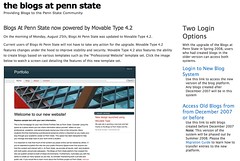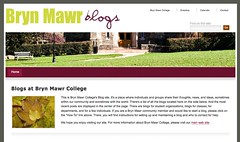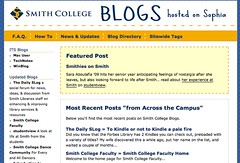Shawn Miller from Duke’s Center for Instructional Technology re-published my post “The UMW Blogs Story” that chronicles the work we have been doing over the last several years at the University of Mary Washington. I am pretty excited that the approach of UMW’s Division of Teaching and Learning Technologies is providing others with fodder for thought. The group here is second to none in my mind, and we play just as hard as we work. But I’m not sure this post is about the people I work with, though I love them, each and every one.
The example of UMW Blogs is just one amongst many. So as a follow-up to “The UMW Blogs Story” which may appear myopic in some ways, I wanted to take a moment to point out some of the work other people at other institutions have been doing with publishing platforms (often called “blogging” platforms 🙂 ).
 There’s Mario Nùñez-Molina‘s RUM Edublogs, who was the first person I started collaborating with while doing ELS Blogs back in the Winter of 2007. His advice, guidance, and help was (and continues to be) invaluable to the imagining of this space at UMW. Moreover, his own publishing platform at the University of Puerto Rico at Mayagüez has an attractive new front page, and is doing some great things with syndication in the “planeta” blogs.
There’s Mario Nùñez-Molina‘s RUM Edublogs, who was the first person I started collaborating with while doing ELS Blogs back in the Winter of 2007. His advice, guidance, and help was (and continues to be) invaluable to the imagining of this space at UMW. Moreover, his own publishing platform at the University of Puerto Rico at Mayagüez has an attractive new front page, and is doing some great things with syndication in the “planeta” blogs.
 Cole Camplese’s thoughts about re-imagining a blogging platform as much more has been immensely useful for us here at UMW. His team’s work is always pushing the limits of these tools to be far more than what they seem, and PSU Blogs is probably one of the best examples of this. I highly recommend Cole’s posts on thinking about campus-wide blogging platforms as publishing spaces/portfolios here and here, as well as a syndicated publishing framework here –important conceptual stuff.
Cole Camplese’s thoughts about re-imagining a blogging platform as much more has been immensely useful for us here at UMW. His team’s work is always pushing the limits of these tools to be far more than what they seem, and PSU Blogs is probably one of the best examples of this. I highly recommend Cole’s posts on thinking about campus-wide blogging platforms as publishing spaces/portfolios here and here, as well as a syndicated publishing framework here –important conceptual stuff.
 Barbara Sawhill and Ryan Brazell’s work at Oberlin College with blogging and the languages (though a quick look at the “Class Sites” tab suggests many more departments) frames one of the most important conversations in my mind: how can language departments all over the country (if not the world) be tapping a publishing platform like this to harness the unbelievably rich archive for language learning that is the open web?
Barbara Sawhill and Ryan Brazell’s work at Oberlin College with blogging and the languages (though a quick look at the “Class Sites” tab suggests many more departments) frames one of the most important conversations in my mind: how can language departments all over the country (if not the world) be tapping a publishing platform like this to harness the unbelievably rich archive for language learning that is the open web?
 Mikhail Gershovich and Luke Waltzer have launched Baruch Blogs this semester and it is a beauty. I particularly love the Baruch Teaching blog they have created which features a number of professors sharing their thoughts and opinions about the best approaches for teaching in a variety of scenarios. What an excellent idea for a blog! You can see it here or read Luke’s post about it here.
Mikhail Gershovich and Luke Waltzer have launched Baruch Blogs this semester and it is a beauty. I particularly love the Baruch Teaching blog they have created which features a number of professors sharing their thoughts and opinions about the best approaches for teaching in a variety of scenarios. What an excellent idea for a blog! You can see it here or read Luke’s post about it here.
 D’Arcy Norman’s stealth launch of U. Calgary Blogs has quickly been delivering the goods. I’m jealous already at how slick and pimped his WPMu install is –those folks at UCalgary are spoiled with this guy! He has also been thinking honestly through the value of a campus blogging platforms, and what it might mean as a learning community publishing platform as well as a vehicle for Open Education. Plus, once D’Arcy gets started on something, you know the tips, tweaks, and general tech goodness is soon to follow, making him the Reverend’s most strategic convert 🙂
D’Arcy Norman’s stealth launch of U. Calgary Blogs has quickly been delivering the goods. I’m jealous already at how slick and pimped his WPMu install is –those folks at UCalgary are spoiled with this guy! He has also been thinking honestly through the value of a campus blogging platforms, and what it might mean as a learning community publishing platform as well as a vehicle for Open Education. Plus, once D’Arcy gets started on something, you know the tips, tweaks, and general tech goodness is soon to follow, making him the Reverend’s most strategic convert 🙂
 I recently peaked over at Laura Blankenship’s Blogs at Bryn Mawr, I love the new theme, but more than that I am amazed at how they seem to be planning on using this space as a way of bringing together their campus community as well as the alumni from all over the country, particularly if the “Who’s Blogging at Bryn Mawr” sidebar widget is any indicator. Using a blogging platform as a space for allowing the students, faculty, and staff to create quick and easy club and organizations spaces online is huge. This is a space to watch in my mind, we are finding much of the same activity here at UMW and I think it marks a changing tide in just how popular and powerful a user-friendly and open publishing platform will be on campus.
I recently peaked over at Laura Blankenship’s Blogs at Bryn Mawr, I love the new theme, but more than that I am amazed at how they seem to be planning on using this space as a way of bringing together their campus community as well as the alumni from all over the country, particularly if the “Who’s Blogging at Bryn Mawr” sidebar widget is any indicator. Using a blogging platform as a space for allowing the students, faculty, and staff to create quick and easy club and organizations spaces online is huge. This is a space to watch in my mind, we are finding much of the same activity here at UMW and I think it marks a changing tide in just how popular and powerful a user-friendly and open publishing platform will be on campus.
 Esther White’s recent work on Smith College Blogs is opening up some interesting ways to both think creating a dynamic front page for a campus blogging platform as well as using blogs as sites for faculty to create there own personal sites.
Esther White’s recent work on Smith College Blogs is opening up some interesting ways to both think creating a dynamic front page for a campus blogging platform as well as using blogs as sites for faculty to create there own personal sites.
And then there is Tony Hirst at the Open University who is developing ways of turning a blogging platform such as WPMu into an automated publishing platform fueled by the RSS from the course sites created at Open Learn. In short, a way for other institutions with flexible publishing platforms to pull in these resources and re-arrange, edit, and re-contextualize as they see fit. A mashup engine for educational resource that can be pulled in within seconds, that is a potentially rich road for simple, syndicated publishing platforms.
In short 🙂 , “what we have here is the non-failure to communicate.” Above is a distributed group of people doing awesome work at their respective institutions and sharing it widely. What comes out of this is a loosely formed community of folks that have together framed one way of thinking about the future of sharing the work done online quickly and easily with very little overhead. What we have here is a community dedicated to sharing and openness, a model for open education that is firmly embedded in their respective institutional communities, yet always already within the community of the open web. Feeds from other campus blogs, online resources, etc. can be brought in easily and shared readily, but that’s the subject of my next post….


Here’s a question — would any of the people listed there be willing to host some OCW for institutions that aren’t ready to spring into WordPress quite yet? There’s an initiative we have coming up at OCWC that is going to focus on less well-financed institutions, and having a place to go to that has good OCW templates and might allow some branding would be crucial…
This leads into another discussion I’ve been thinking of lately — when institutions like UMW do it so well, does it make sense that we all should struggle with the WPMU upgrade? Or might it make sense to pool resources, and have one institution maintain mediawiki and one wordpress, and one who knows what. That’s right — I’m talking communism! Glass Bees shizzle, ma mizzle.
OK, long day I guess… but point stands, i think?
Pingback: Edublogs RUM - Edublogs RUM
Jim … thanks much for the (continued) shout out! You guys have taken the ball and really run with it. We’re now looking at how we take much of what you are doing at the front end of your blogging environment and integrate it into ours. We do have some new tricks up our sleeves and are so psyched about the emerging possibilities in this space. Faculty and students alike are embracing the platform and are really using it in new and novel ways. Fun to watch!
I am hoping our proposal gets picked up at ELI! I can’t even imagine a Survivalist approach to telling our story … could be an absolute blast!
And, Mike … if you guys do Shib we might be willing to play. Although we do not use WPMU, we use Movable Type as our blogging platform — it is a long (but perhaps good) story.
@Mike,
I have a more prolonged comment for you ideas here, so I’ll hold off ’til I have a bit of time to work through them, because your point is an important one I want to address. So like the Terminator, “I’ll be back.”
@Cole,
I have to apologize, I just realized I have trackbacked to those posts about 55 times 😉 I guess I liked them, what can I say?
As for ELI, could be a lot of fun, i hope it flies as well. And even if it doesn’t, I look forward to the time to sit down and talk more in depth about this stuff in person, finally. maybe then I won;t feel the need to trackback as much, I imagine my posts where I saw the same thing over and over can get mildly annoying, but it’s all I got!
Pingback: Metapizza » Here’s to the Reverend
Really interesting post and consequently I’ve just spent the last hour learning about what others are doing with WPMU at their universities.
Coincidentally, I started a Google Group a couple of weeks ago for people running WPMU sites in universities and colleges:
http://groups.google.com/group/wordpressmu-in-he
There’s just a few of us from the UK on their now, but it would be good to have others join and share their views and support. There’s plenty of community support for WordPress on the web, but nothing specific to the administration, use and advocacy of it in universities and colleges.
Cheers
Joss